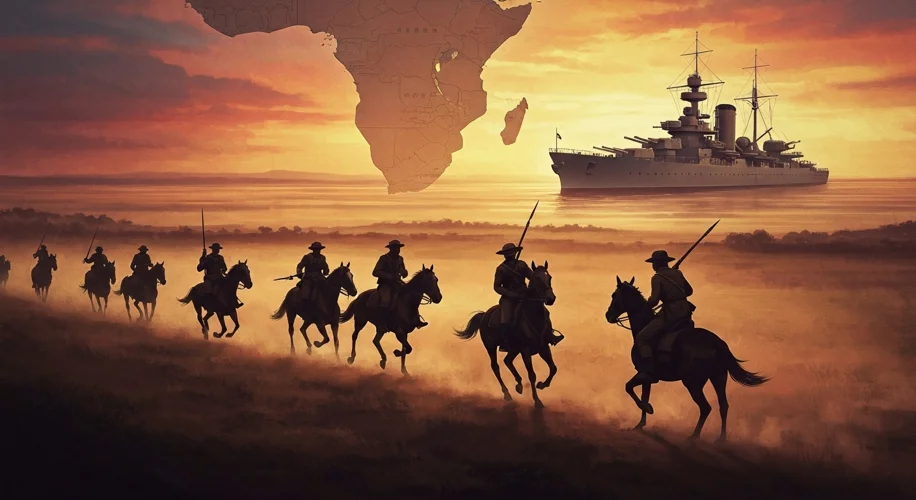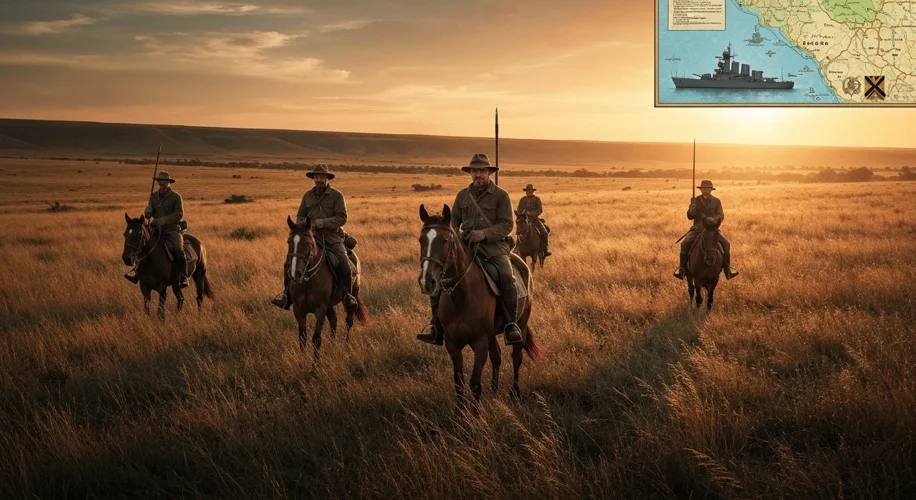In the sprawling, sun-baked landscapes of Southern Africa at the turn of the 20th century, a peculiar alliance was forged, not on the battlefield of grand empires, but in the shared defiance against a common, formidable foe: the British Empire. This was the era of Kaiser Wilhelm II’s Germany, a burgeoning industrial power eager to carve its niche on the world stage, and the Boer Republics of the Transvaal and the Orange Free State, proud, independent farming communities with deep roots in the African soil. Their bond, though ultimately unable to withstand the might of British imperialism, was a testament to a shared vision and a desperate hope.
The roots of this alliance can be traced back to the mid-19th century, when the Great Trek saw thousands of Boers, descendants of Dutch, French, and German settlers, migrate inland from the British-controlled Cape Colony. They sought to escape British rule and establish their own republics, cherishing their Afrikaner identity, language, and way of life. Meanwhile, in Europe, the newly unified German Empire, under Otto von Bismarck and later Kaiser Wilhelm II, was increasingly assertive in its foreign policy, viewing colonial expansion as a sign of true global power. Britain, with its vast empire, was the dominant imperial force, and Germany felt increasingly sidelined, eyeing British possessions with a mixture of envy and resentment.
The discovery of diamonds and gold in the Boer territories, particularly the Witwatersrand gold fields, dramatically escalated the region’s strategic importance and brought British interests into sharp conflict with Boer sovereignty. The Jameson Raid of 1895, a failed British-backed attempt to overthrow the Transvaal government, only inflamed tensions. Germany, seeing an opportunity to weaken its imperial rival and potentially gain influence in Southern Africa, began to cultivate a relationship with the Boer republics.

Kaiser Wilhelm II, a fervent proponent of Weltpolitik (world policy), saw the Boers as natural allies against British expansion. Germany’s motivations were multifaceted. Economically, German businesses had significant investments in South African mining and trade, and a stable, friendly republic would protect these interests. Strategically, supporting the Boers could disrupt British control over vital trade routes to India and create a valuable distraction for the British military. Politically, it was a chance to assert German naval power and prestige by challenging British dominance, even indirectly.
The Boers, led by figures like Paul Kruger, President of the South African Republic (Transvaal), viewed Germany as a potential counterweight to British pressure. Kruger was a shrewd statesman who understood the precariousness of their position. He actively sought foreign support, and Germany’s overtures were a welcome development. The famous Kruger Telegram, sent by Kaiser Wilhelm II to Kruger in January 1896 following the Jameson Raid, expressed congratulations for repelling the raid and condemned the British action. While seemingly a minor diplomatic gesture, it sent a powerful signal of German solidarity and emboldened the Boers.
As the clouds of war gathered, culminating in the outbreak of the Second Boer War (1899-1902), German sympathy for the Boers became more pronounced. German volunteers fought alongside the Boers, and Germany supplied the republics with much-needed arms and ammunition, including artillery pieces from Krupp. This support, however, was carefully calibrated; Germany was unwilling to risk outright war with Britain, especially given the state of its own navy at the time. The German military, particularly Admiral Alfred von Tirpitz, harbored ambitions of challenging British naval supremacy, and the Boer War provided a testing ground for diplomatic and logistical strategies, albeit from a distance.
The Second Boer War was a brutal conflict. The Boers, masters of guerrilla warfare, inflicted heavy casualties on the British forces. However, the sheer might of the British Empire, with its vast resources and manpower, eventually proved overwhelming. The British implemented scorched-earth tactics and established concentration camps, leading to immense suffering among the Boer civilian population. Despite their fierce resistance, the republics were ultimately defeated in 1902, annexed into the British Cape Colony.
The German-Boer alliance, though ultimately unsuccessful in preserving Boer independence, had significant repercussions. It heightened Anglo-German tensions, contributing to the complex web of rivalries that would eventually erupt into World War I. The war also exposed the limitations of British military preparedness and spurred reforms. For Germany, the episode reinforced its belief that a powerful navy was essential for its global ambitions, a sentiment that would fuel the naval arms race with Britain in the years leading up to 1914.
In retrospect, the German-Boer alliance was a bold, albeit ultimately futile, attempt by two distinct entities to resist the juggernaut of British imperialism. It was a diplomatic gambit born of shared strategic interests and a mutual desire to curb British power. The image of German sympathy and support for the Boers, even if limited, resonated deeply in the consciousness of Afrikaners and served as a poignant reminder of a time when the distant German Empire stood, however briefly, as a bulwark against the encroaching shadow of the British lion. It’s a chapter in history that illustrates how shared opposition can forge unexpected bonds, even in the face of overwhelming odds.

